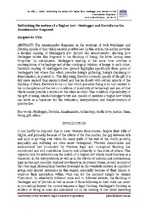Rethinking the notion of a 'higher law': Heidegger and Derrida on the Anaximander fragment
Abstract
The Anaximander fragment, in the readings of both Heidegger and Derrida, speaks of that which exceeds positive law. In this article, the author provides a detailed reading of Heidegger’s Der Spruch des Anaximander, showing how Heidegger relates this fragment to his thinking of Being, the latter having been ‘forgotten’ by metaphysics. Heidegger’s reading at the same time involves a contemplation of technology and of the ontological relation of beings to each other. Derrida’s reading of Heidegger’s Der Spruch highlights specifically those parts of Heidegger’s text where that which precedes Being’s gathering, Being’s disjoining or dissemination, is pointed to. This disjoining, Derrida contends, speaks of the gift of a day more ancient than memory itself and ties in closely with certain aspects of the thinking of Marx. Derrida’s focus on that which precedes Being is in turn related to his contemplation of the law or condition of possibility of technology and also of that which makes possible a relation to the other as other. This condition of possibility, or the gift of Being, which Heidegger’s text also speaks of, involves a ‘higher law’ which can serve as a ‘measure’ for the evaluation, interpretation and transformation of positive law.

